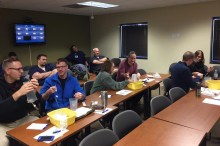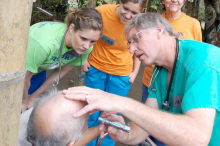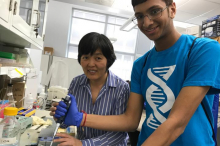Evers Elected to Association of American Physicians
Pediatric Experts Find Aromatherapy Effective for Promoting Infant Healing, NAS Recovery
Research-Based Training to Identify Substance Misuse
Even when it’s your job, it’s not easy to ask people about substance use. Kalea Benner’s current research is based on this fact.
NIH Releases Notice - Implementing Limits on NIH Grant Support to Strengthen Biomedical Research
In response to a major challenge of ‘hypercompetition’ for NIH awards, Director Francis Collins has recently announced steps that will be implemented over the next several months to implement limits on NIH Grant Support for individual laboratories.
NIH Applications for Clinical Trials and Clinicaltrials.gov
NIH issued a new policy to increase the availability of information about clinical trials via ClinicalTrials.gov. As part of that new policy, NIH grantees must certify compliance with federal regulations in applications and progress reports. Grant applications and progress report for applicable clinical trials* require certification that clinicaltrials.gov requirements have been met.
SRAS Provides More Guidance on PI Financial Report
The PI Financial Report Review Best Practices document on the COM SRAS website has been updated and can be found here. It is critical that these reports be reviewed on a routine basis, especially to ensure all your projects active for the period are listed, that expenses for each project are in line with your expectations, and that individuals paid from
Applications Accepted for Halcomb Fellowship In Medicine and Engineering
Halcomb Fellowship In Medicine and Engineering
Community Paramedicine Pilot Projects Address Gaps, Reduce Costs of Emergency Medicine
Shoulder to Shoulder Global Celebrates its 10th Anniversary in Ecuador
Celebrating 10 years of continued success and commitment to the Santo Domingo de los Tsáchilas community in Ecuador, the University of Kentucky’s Shoulder to Shoulder Global (STSG) and the Hombro a Hombro Foundation are hosting a health care brigade from May 12 to May 21 at their clinic in Santo Domingo, Ecuador.
Markey and LLS Host Sixth Annual ‘Meet the Researcher Day’
The University of Kentucky Markey Cancer Center and the Leukemia and Lymphoma Society (LLS) recently hosted their sixth annual "Meet the Researcher Day" on April 27- 28. Meet the Researchers Day is a field trip given as a prize to schools in the region who successfully raise more than $1,000 for the LLS's Pennies for Patients campaign.




